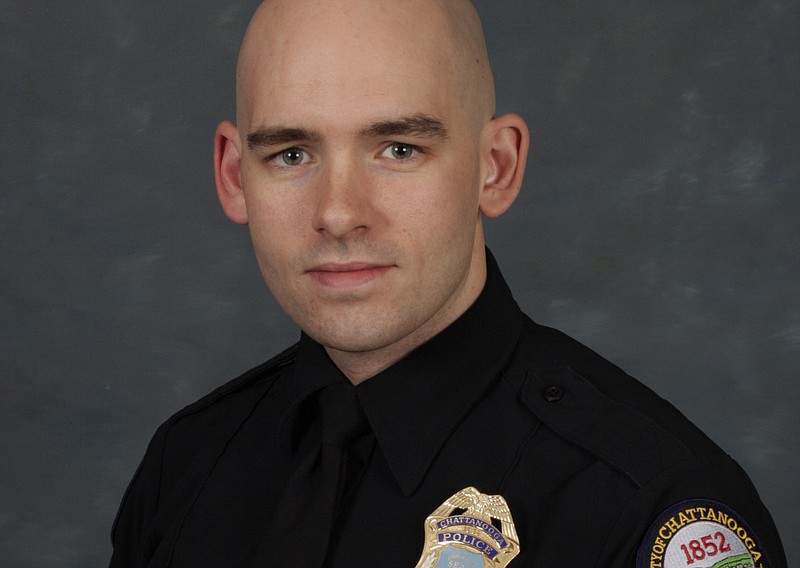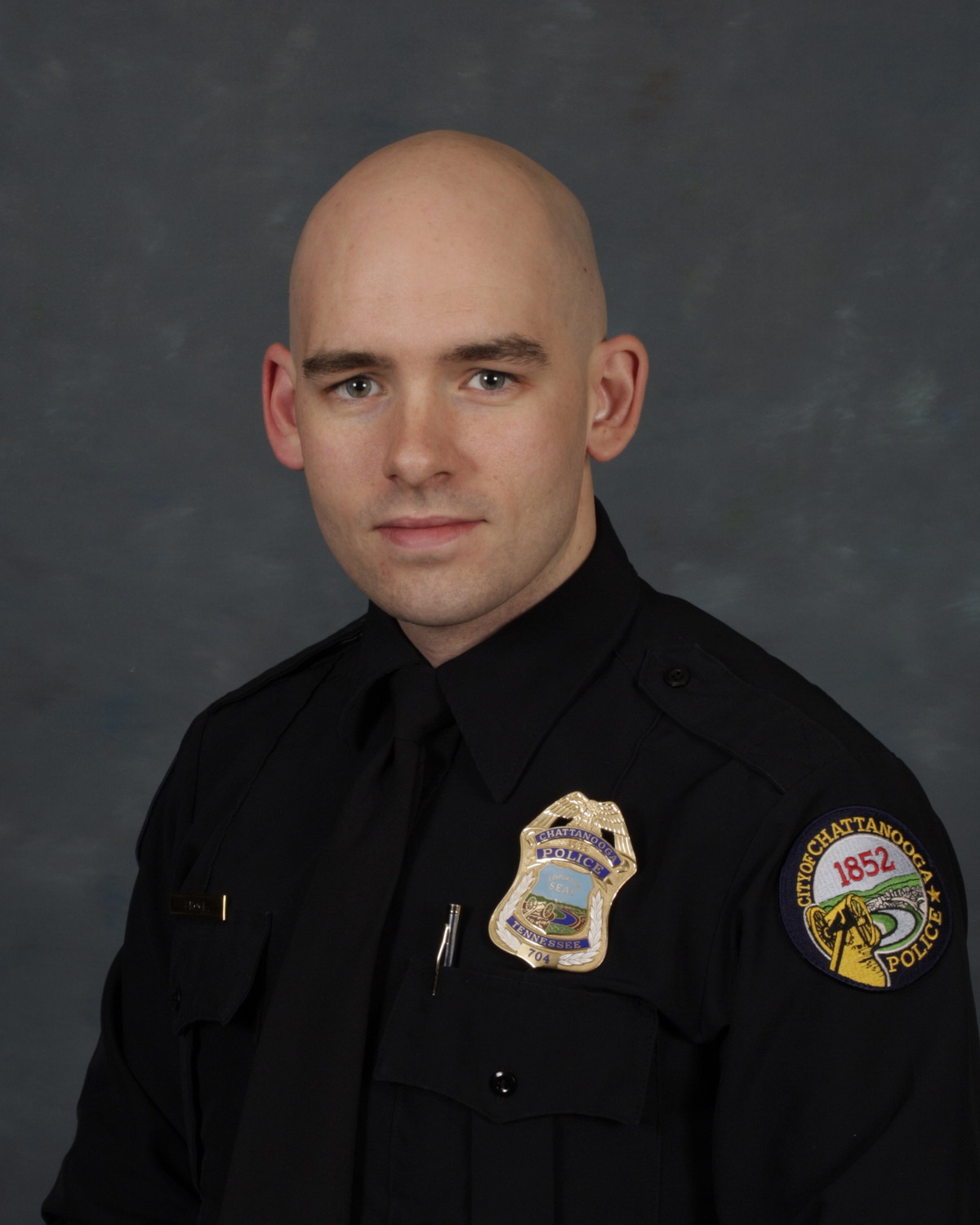The Chattanooga Police Department fired an officer last week who was charged with domestic assault and being separately investigated by internal affairs for soliciting prostitutes.
Former Police Chief Fred Fletcher sustained the following allegations against Charles Andrew Brock on July 5 after an internal affairs investigation: Failure to secure firearms, violation of condition of release, insubordination, and the criminal offense of prostitution.
Brock can appeal the decision through an administrative judge. But neither he nor his current attorney, Marty Lasley, could be reached for comment Tuesday.
An officer since 2008, Brock has been on paid administrative leave since he was charged with one count of domestic assault for allegedly attacking his wife during a fight over a cellphone on Dec. 25, 2016.
Police, however, didn't uphold that assault violation at his administrative hearing last week. And neither did prosecutors, who dismissed his criminal charge in March before it went to the grand jury.
Brock's wife, Carey Brock, told responding officers on Dec. 25 and in a follow-up interview the next day she did not want her husband to be arrested. Because of that, and limited evidence about what happened that night, an assistant district attorney suggested on March 2 the couple should handle their case through divorce proceedings, which Carey Brock had filed three days after the incident, according to a court document obtained by the Times Free Press.
Within a week, Hamilton County District Attorney General Neal Pinkston agreed to dismiss the case before it could go any further.
The charge has since been expunged.
Carey Brock declined to comment Tuesday on her husband's termination, but maintains she wanted to prosecute and that he encouraged her in the days after the attack not to go to the police.
Alleged domestic violence victims often make conflicting statements because they're either shell-shocked afterward or afraid of their attacker, some criminal justice experts said.
"You're talking about a police officer with officer friends who knows the system, knows how to use a weapon, and knows how to take someone down," said Verna Wyatt, a co-founder of Tennessee Voices for Victims. "They're going to be intimidated by the added layer of power the police officer has."
Moreover, the stakes are higher for a potential prosecution of a police officer since he would lose his ability to serve if convicted of domestic violence, said Mark Wynn, a former police officer who now coaches departments nationwide on officer-involved investigations.
"It's a big deal," Wynn said. "It may be a misdemeanor in the criminal code, but there's a lot at stake. First, it's the law. Second, you've got a responsibility to show there's no ethical issues ... when you're investigating a police officer."
The fact that Brock was a police officer had no influence on the case, said Melydia Clewell, a spokeswoman for the Hamilton County District Attorney's Office.
Domestic violence cases can be tough to prosecute in general because of conflicting statements, uncooperative witnesses and different standards of proof between police officers and prosecutors.
"It is very common for the alleged victim of a domestic assault to refuse to cooperate with investigators and prosecutors," Clewell said. "Cases are prosecuted based solely on the facts and evidence of a case.
"Mrs. Brock repeatedly told responding officers that she did not want her husband arrested, she just wanted him out of the house," Clewell said.
That's true, Carey Brock said.
But in the days after the attack, when there hadn't been an arrest yet, Carey Brock said she was scared. Her husband told her not to talk to police, she said, because they'd determine she was the primary aggressor for taking his phone - and then arrest her.
"Based on investigators' conversations with both Mr. and Mrs. Brock, there was no indication of any intimidation," Clewell countered. "Mr. Brock appeared cooperative with investigators. There was no direct evidence of any assault taking place and he was allowed to leave."
Officers are encouraged to determine the primary aggressor and make an arrest on scene. But sometimes that determination requires a few days of reviewing the evidence, said Mike Williams, chief of the Signal Mountain Police Department and a former Chattanooga police officer.
"The officer just wasn't comfortable with charging either one at that point," Williams explained, adding that his force hasn't dealt with domestic violence cases as much as a bigger force like Chattanooga. "He felt like there was no immediate threat for the violence to continue or for him to come back and harm her. And he didn't feel like there was enough information about who was the primary aggressor. So he stayed in touch with her for the next couple of days and she gave him some more information."
That information included a photo of Carey Brock with a red bruise on her chest and her husband's possible solicitation of prostitutes in 2014.
Charles Andrew Brock didn't want to hear any of the state's evidence during his first few appearances in Hamilton County General Sessions Court in February. Carey Brock said he turned down a prosecutor's offer for probation and asked to go straight to the grand jury.
A grand jury is a group of citizens who listen to the facts and decide whether to formally "indict" someone and send their case to Criminal Court. The sessions are secret, no defense attorneys are allowed, and only prosecutors present evidence.
Clewell said Pinkston has discretion over which cases go into the grand jury, and that many cases are resolved between the lower courts and the grand jury. Pinkston dismissed this case because the facts didn't support the charge, Clewell said.
But others noted the grand jury is a major turning point in a case since defendants who are indicted must continue fighting their case in Criminal Court.
"Essentially, they're making sure there's three things," said defense attorney Joshua Weiss. "One, a crime alleged. Two, some testimony or evidence. And then three, making sure the alleged crime occurred in the county. That's such a low standard, going through the grand jury results in indictment 99 percent of the time."
Contact staff writer Zack Peterson at zpeterson@timesfreepress.com or 423-757-6347. Follow him on Twitter @zackpeterson918.

